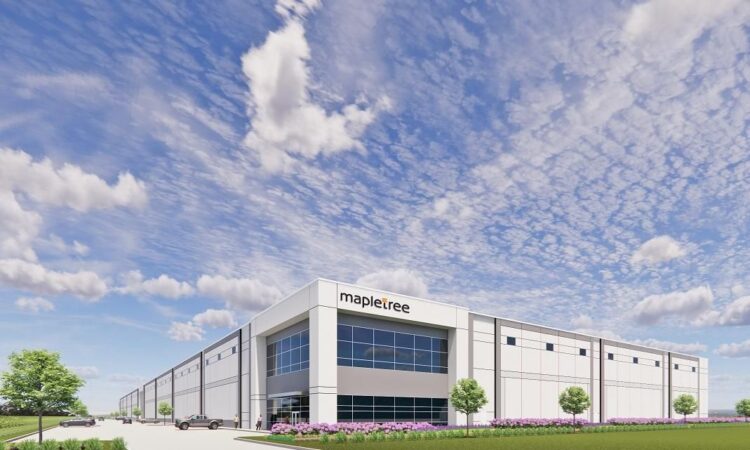

In May, Mapletree purchased an 18.1-acre site at 3600 Houbolt Road, formerly known as 23551 Vetter Road, to build a 312K SF industrial warehouse.
The Midwest’s industrial sector is stepping into the national spotlight, said Richard Prokup, U.S. CEO at Mapletree, a global real estate development, investment, capital and property management firm.
Since 2020, average asking rent rates in the sector have risen 49%, a trend that’s ongoing across the region. Markets such as Omaha, Nebraska, Detroit and Cleveland, Ohio, saw vacancy rates well below 4% in Q2, an impressive feat compared to the national average of 9.3% — the highest rate in 10 years. Second-quarter construction activity also remained steady, with 39.7M SF in the pipeline.
Perhaps no market in the region, however, is better positioned than Chicago, Prokup said.
“There’s been a fundamental shift in the dynamics in the Chicago industrial market,” he said. “A lot of it is based on the evolution of e-commerce and the sophistication of the supply chain. We saw many other markets take a dip in activity over the past few years, but in Chicago, it’s really been the opposite.”
Prokup will speak at Bisnow’s Midwest Industrial Summit on Nov. 20 in Chicago. Register here.
Bisnow spoke with Prokup to learn more about trends in the market, the biggest considerations guiding Mapletree’s investment strategy and the bright spots and challenges in today’s market.
Bisnow: How do you view the current state of the industrial market in the Midwest?
Prokup: Without question, the market that stands out the most right now is Chicago. I’ve been based in Chicago for my whole career and it’s now coming into its own. It’s always been considered a solid market with a large population base and good connectivity, but it was a relatively uneventful market with slower rent growth. That’s not the case anymore.
Chicago is well-positioned because it has two dozen intermodals that are increasingly relied upon to bring goods into the country. The city also has unprecedented connections to the expressways, so if goods arrive by rail, they can be easily transferred to trucks and shipped throughout the central U.S.
A lot of other industrial markets saw activity decline in recent years, but that wasn’t the case in Chicago. It absorbed what it developed. The dynamics are good right now and demand is strong.
Surrounding suburbs that used to be considered outliers — such as Bolingbrook, Illinois — are now very solid infill markets. Other high-performing markets in the Midwest include Columbus, Ohio, and Louisville, Kentucky.
Bisnow: How is Mapletree approaching capital deployment and market positioning today, and what are the biggest considerations guiding your strategy?
Prokup: Mapletree, at its heart, has always been a developer. We typically have in excess of $6B worth of development underway around the globe, but in the U.S. we grew primarily through acquisitions.
We made very large logistics portfolio purchases in 2019 and 2021, as well as in office, data centers and student housing. That’s how we grew our U.S. platform from virtually nothing to now over $15B in assets under management. It’s always been part of our plan to develop here, and that’s where we’ve shifted our focus.
The returns associated with development are very attractive, which is why, globally, we’ve always been a big developer. In this particular cycle, development is poised for strong returns. A couple of years ago, there was a bit of an overhang with roughly 750M SF under development across the country. Then, interest rates went up and activity slowed. When that happened, speculative development declined nationally and has fallen below historical averages for the past nine quarters.
As a result, we’re now looking at an undersupply of newly developed Class-A products that will hit the market in about a year or so. Our development strategy is focused on delivery ahead of this anticipated shortage, with the goal of eventually becoming one of the largest industrial developers in the country.
Bisnow: What are some of the major challenges facing the Midwest’s industrial market?
Prokup: Not all of the Midwest’s markets have fared equally. As much as Chicago is a shining star, some markets — such as Memphis and the east side of Indianapolis — experienced overbuilding, and there’s now a bit of a surplus that needs to be absorbed.
I don’t think there are any challenges unique to the Midwest that a lot of other U.S. markets haven’t encountered. I wouldn’t say the industrial real estate market ever crashed, but it definitely slowed down from the pandemic era.
Bisnow: What projects is Mapletree engaged in, or recently completed, in this market?
Prokup: Unsurprisingly, our primary focus is Chicago, where we own and manage 10M SF of industrial assets. We have three development projects underway there, including a new 150K SF logistics facility in Bartlett. That project is fully entitled and recently broke ground.
We recently closed on two sites in the Joliet submarket where we plan to develop 418K SF and 312K SF Class-A logistics facilities. The sites are situated along the I-80 and I-55 interchange, providing direct connectivity to the Joliet Intermodal Center, which is North America’s largest inland port. We’re big believers in this market and foresee that both projects will be great additions.
Bisnow: What inspired you to speak at this Bisnow event?
Prokup: I try to stay engaged in what’s happening in Chicago. It’s important to get out there, hear what your peers have to say and be willing to share your insights. Mapletree is very bullish on Chicago, and we’re excited to share our story with the market while connecting with other key players and learning about their work.
This article was produced in collaboration between Mapletree and Studio B. Bisnow news staff was not involved in the production of this content.
Studio B is Bisnow’s in-house content and design studio. To learn more about how Studio B can help your team, reach out to studio@bisnow.com.





